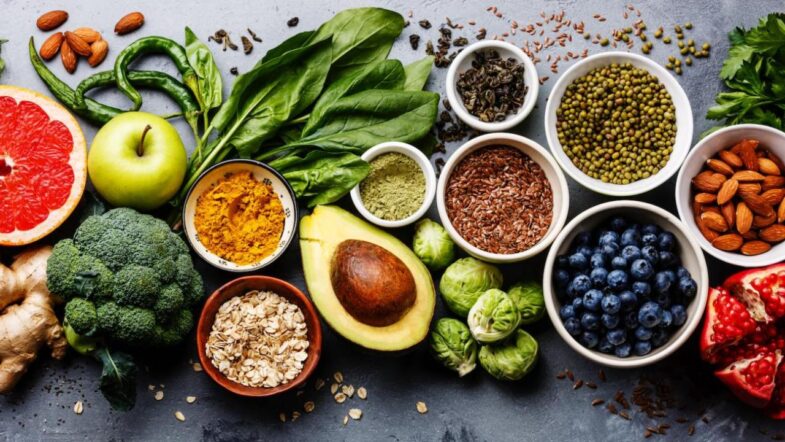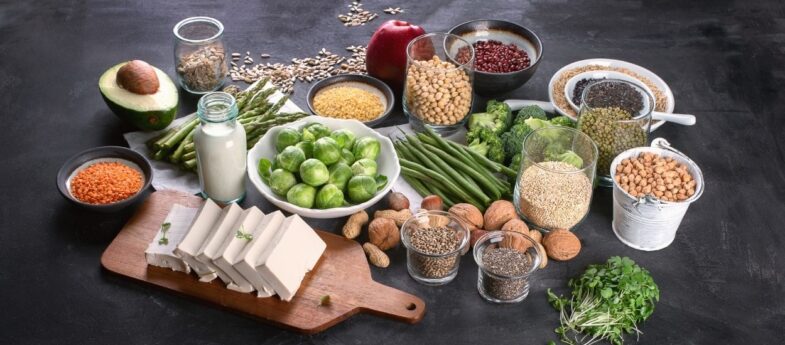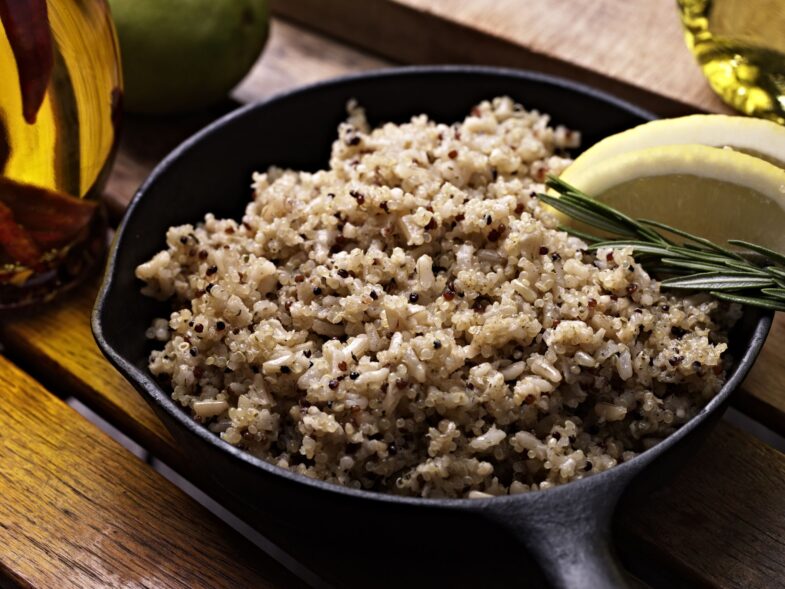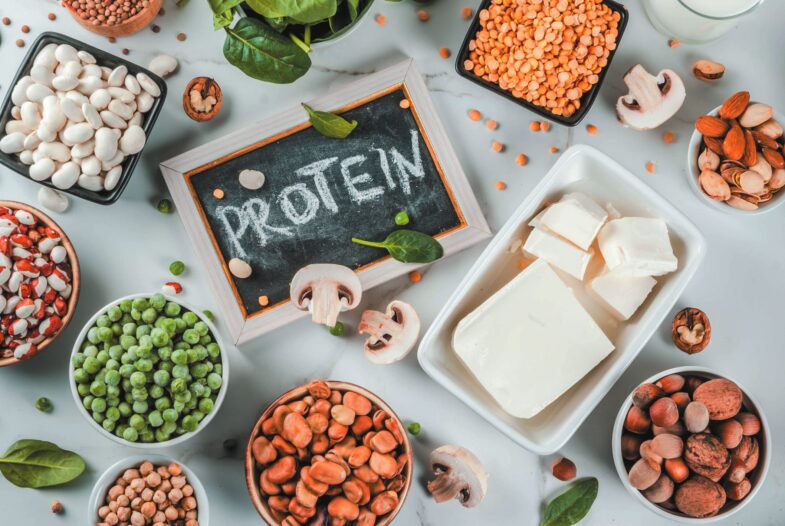Plant-based proteins are plant sources of essential amino acids that can be used to help meet dietary requirements for protein. Unlike animal proteins, plant-based proteins contain no cholesterol and are typically lower in saturated fat and sodium. For individuals looking to improve their health without making major dietary changes, substituting some animal proteins with plant-based options is a great way to increase the nutritional density of a diet while also reducing the risks associated with consuming too much animal protein.
This guide will provide an introduction to the benefits of incorporating more plant-based protein into one’s diet, as well as provide insight into common plant-based sources and tips on how to make sure one’s nutritional needs are being met when making diet changes. Additionally, ideas on how to incorporate more plant-based foods into one’s meals in order to make sure proper nutrition is being achieved will also be provided.
Where to find them?

Source: cuimc.columbia.edu
Plant-based polypeptides provide many health benefits and are a great way to diversify your diet. There are a variety of different sources of high-protein plant-based foods, from legumes and grains to nuts and seeds. Each of these sources offers unique advantages, so it’s important to know what each food group has to offer:
Legumes -This group contains beans, peas, lentils, soybeans, and peanuts. These are high in protein and provide large amounts of fiber and other essential vitamins and minerals. Legumes can be eaten cooked or raw, on their own, or as an ingredient in another dish such as chili or curry.
Grains – Grains are a good source of protein as well as carbohydrates that provide energy for the body. Examples include wheat berries, oats, quinoa, and other whole grains like barley and bulgur wheat. Whole grains should be sprouted before cooking or soaking to get the most nutrition out of them.
Nuts & Seeds – Nuts and seeds make up another type of plant-based protein source that is packed with nutrients including healthy fats (omega-3 fatty acids). Some examples include almonds, walnuts, chia seeds, flaxseeds (linseeds), pumpkin seed kernels (pepitas), and hemp hearts/seeds. In addition to snacking on them raw or roasted lightly in their shells; these can be used in baking for added crunch or added whole into salads for extra flavor.
Veggies & Fruits – Vegetables such as spinach & kale contain some level of protein; however they don’t typically provide enough nutrition on their own to sustain our body’s needs by themselves but when coupled with whole grains; they create a complete amino acid profile necessary for muscle building & maintenance, especially during strenuous physical activity such as weight training or running long distances, etc.
Fruits also contain natural sugars that give us sustainable energy throughout the day while providing beneficial phytonutrients like flavonoids& anthocyanins which contain powerful antioxidants with anti-inflammatory properties found in dark-colored berries for instance blueberries & blackberries.
How to Incorporate Plant-Based Protein into Your Diet

Source: womensrunning.co.uk
The best way to start adding more plant-based proteins to your diet is by swapping out other sources for plant proteins. For example, instead of using chicken or beef in recipes, you can opt for pulses (such as lentils or beans), tofu, or tempeh. Also consider reducing the number of animal ingredients you eat and supplementing with plant sources like quinoa, soy products, nuts, and seeds.
You can also look for ways to add more whole grains into your meals; oats, rice, bulgur wheat, and wheat berries are all tasty whole-grain options that contain high levels of protein. Furthermore, you may want to consider adding green leafy vegetables like spinach or kale which contain good amounts of protein too!
Finally, it’s important to choose the right snacks when trying to introduce more plant-based proteins into your diet as well! Many store-bought snacks may contain unhealthy ingredients like refined sugars or processed fats so opt for healthier alternatives such as mixed nuts or nut butter instead. There are a variety of plant-based bars available such as those made from peas and brown rice which offer a convenient source of protein!
Are you looking for some recipes?

Source: womenshealthmag.com
The following recipes offer delicious plant-based meal ideas that make it easy to increase your protein intake without needing to buy animal products.
Vegetarian Chili – This chili contains kidney beans, black beans, lentils, and chickpeas for an incredibly high protein and fiber content. Top it off with diced tomatoes, onions, and garlic for the perfect combination of flavor. You can also add vegetables like bell peppers or mushrooms for extra texture and crunch!
Sweet Potato and Black Bean Bowl – Cook your sweet potatoes until they reach a nice crusty texture on the outside while still retaining their creamy insides. To the cooked sweet potatoes add black beans, corn kernels, avocado slices, cilantro leaves, chopped tomatoes, onion slices — whatever you want to make a fantastic vegan meal!
Mushroom Risotto – Give your risotto a major nutrition boost by substituting traditional meat with earthy mushrooms! A combination of cremini mushrooms plus an Italian variety such as porcini or shiitake will give you great flavor. Serve this dish over brown rice or quinoa for added protein too!
Veggie Kabobs – Vegetable kabobs make for an easy plant-based protein option that you can cook on the grill or stovetop depending on weather conditions. Use any combination of vegetables that suit your taste buds from peppers to onions to zucchini slices. Depending on what olives & nuts you use — these kabobs will become a high source of healthy monounsaturated fats too!
Summary

Source: nutritionletter.tufts.edu
When it comes to plant-based proteins, there are many options to choose from. Beans, legumes, nuts, seeds, and grains all provide great sources of protein that can supplement any diet. They require little preparation and can easily be incorporated into a variety of recipes. Further research is still needed on the health benefits of plant-based proteins and the best ways to incorporate them into everyday life.
In conclusion, adding plant-based proteins to one’s diet helps increase nutrient intake while reducing cholesterol and sodium levels in meals. These sources are often low in saturated fat as well as low in calories which may aid in weight loss or maintenance efforts. As well as being easy to prepare and packed with essential vitamins and minerals for overall well-being, plant-based proteins add flavor to meals while providing sustenance for the mind and body.




